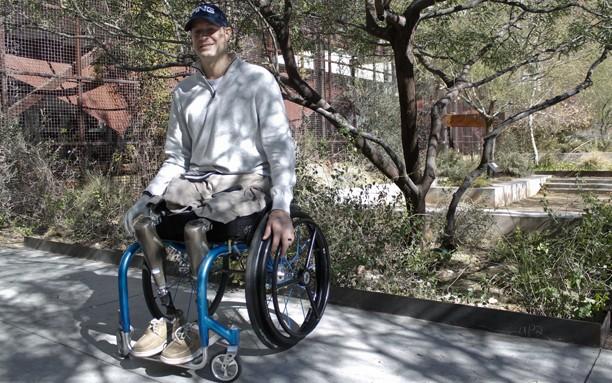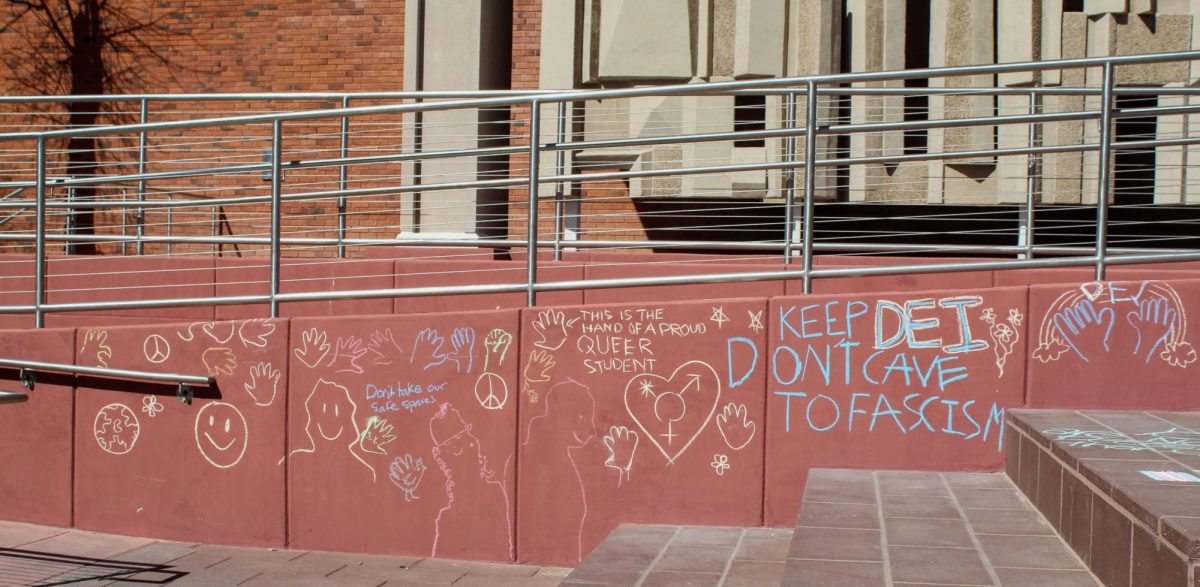Brian Kolfage had just woken up and was heading to the gym when an enemy 107-millimeter Russian-made rocket changed his life forever.
Kolfage, 31, now a UA architecture senior, was on his second tour of Iraq and stationed with the Air Force at Joint Base Balad, north of Baghdad, when a rocket took his legs and his right hand on the afternoon of Sept. 11, 2004.
“I didn’t really know what was going on at the time, as you can imagine,” Kolfage said. “I was in shock, and then it was all smoky. I could smell the smoke in the air and it was all kind of a blur. And then I heard the, you know, the sirens that go off when there is incoming [rockets], I heard the siren go off and that is kind of when it clicked that I knew I was hit by a rocket.”
Kolfage was rushed to the base hospital for emergency life-saving surgery and was then flown to Germany, where his wounds were cleaned, before he was flown to Walter Reed National Military Medical Center.
Kolfage, who was a military police officer for the Air Force, ended up going through 16 surgeries on his path to recovery. He was kept in a medically induced coma for the first two weeks after the attack. After a month at Walter Reed, he was moved out of intensive care and began physical therapy.
After a year at Walter Reed, Kolfage decided to head to Tucson to work at Davis-Monthan Air Force Base as a civilian. He continued his physical therapy with Hanger Prosthetics and Orthotics.
“They [Walter Reed] had two or three guys who worked on prosthetics, that worked for the hospital, and there was like 50 patients. So there was two or three guys trying to work on 50 patients, but I really needed a whole team for myself, so I got nowhere,” Kolfage said.
Kolfage left Walter Reed unable to walk. He then began working with Hanger, who provided an entire team for up to 12 hours a day in the beginning. He began learning to walk on small prosthetic legs, working his way up to longer legs as he went.
The hardest part of his rehabilitation was learning to balance himself and to trust his new legs “because you always feel like you are falling,” Kolfage said.
However, Kolfage kept a positive attitude throughout his recovery.
“I was never really pissed about losing my legs or anything like that because I saw the other guys who were missing like half their heads or there was guys who were literally drinking all their meals through a straw,” Kolfage said. “Just seeing those guys who will never live a normal life again, it put it in perspective. I didn’t really care about losing my legs anymore. I was just happy that I was alive.”
Kolfage eventually began studying architecture at the UA. After the first two years, the equipment and funding provided by Veterans Affairs was not enough. Kolfage applied for the Tillman Military Scholars scholarship through the Pat Tillman Foundation in 2011, and was accepted in summer of that year.
The need-based scholarship is in honor of Pat Tillman, who lost his life in Afghanistan. The program “supports our nation’s active and veteran service members and their families by removing financial barriers to completing a degree or certification program of choice,” according to the scholarship’s site.
This year, the Tillman Military Scholars program began accepting applications Jan. 14, and will continue accepting applications until Feb. 15, according to Cody Nicholls, assistant dean of students and director of the Veterans Education and Transition Services initiative. Active duty service members and veterans, along with their spouses, are eligible to apply for the scholarship.
Scott Romo, an Army veteran and a psychology senior, plans on applying for the scholarship this year. He said he feels he may go beyond what the GI Bill covers and that this would help relieve the financial stress. However, he said it is not just for financial reasons; he also sees Pat Tillman as a role model.
“It [Tillman Military Scholars] is really designed towards folks who have that element, that desire, who have served but also want to continue to serve,” Nicholls said.
There is an informational Tillman Military Scholars meeting on Jan. 25 at 3 p.m. in the Veterans Education and Transition Services Center, on the fourth floor of the Student Union Memorial Center. In attendance will be previous Tillman Military Scholars who will give advice to prospective applicants, Nicholls said.









